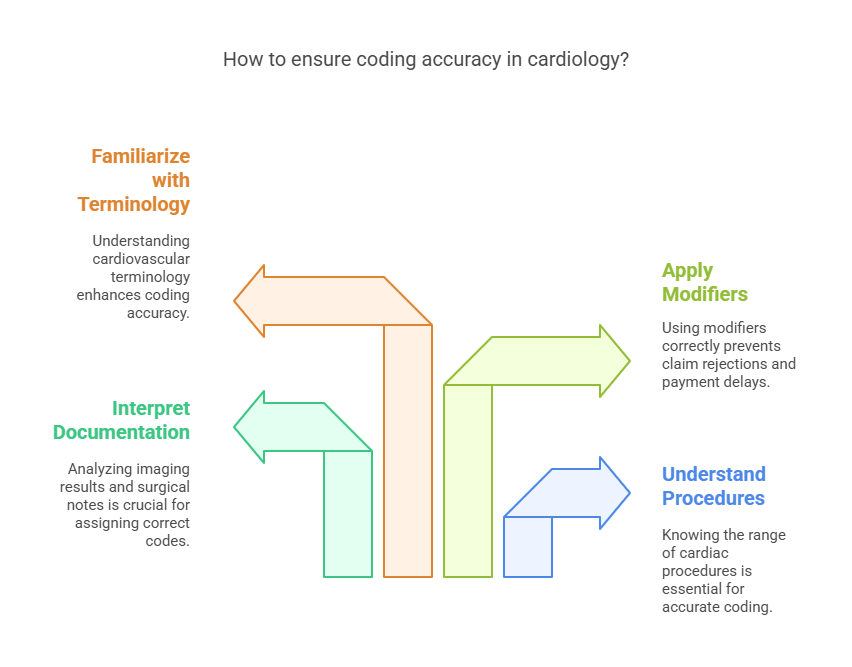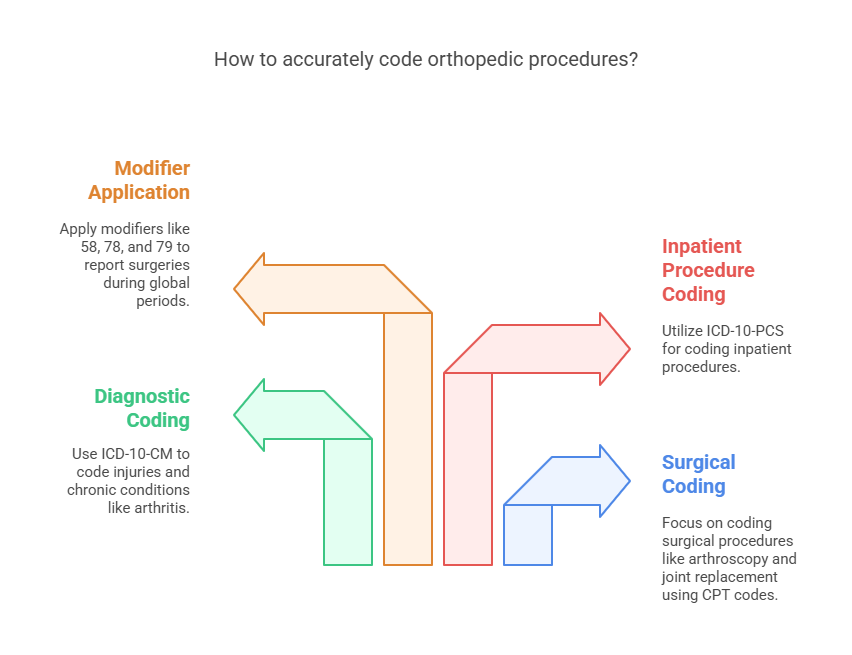Advanced Medical Coding in Specialty Areas: Cardiology, Oncology & Orthopedics
As the field of healthcare becomes more specialized and intricate, so too does the practice of medical coding. Advanced medical coding goes beyond basic documentation translation; it demands precise knowledge of procedures, diagnoses, and coding systems within specialized areas of medicine. Among the most complex and in-demand specialties are cardiology, oncology, and orthopedics. Each requires a deep understanding of anatomy, treatment protocols, and reimbursement requirements.
This blog will explore how advanced medical coding applies to these three specialties, the skills required, the most common coding systems used, and the benefits for coders who pursue these paths.
The Value of Specializing in Advanced Medical Coding
Medical coding is a critical function within the healthcare industry, as it translates medical diagnoses, procedures, and services into universally recognized codes. These codes are essential for billing, insurance claims, and maintaining accurate health records. However, like many professions, medical coding offers opportunities for specialization. Specializing in advanced medical coding provides coders with the ability to hone in on particular areas of the healthcare field, creating experts with detailed, nuanced knowledge in specific areas. In this article, we will explore the value of specializing in advanced medical coding, both for the professionals involved and for the healthcare industry as a whole.
The Importance of Specialization in Medical Coding
Specialization in medical coding refers to focusing on a specific area of healthcare, such as cardiology, oncology, orthopedics, or radiology, rather than working across a broad spectrum of medical records. While general medical coders handle a wide range of coding tasks across different departments, specialized coders develop expertise in specific medical areas. This level of expertise enables them to make more accurate and informed coding decisions, ensuring that healthcare providers are reimbursed appropriately for their services. For those looking to advance in this field, choosing the Best Medical Billing and Coding Certification Programs in 2025 is crucial. These specialized programs provide in-depth training and certification, empowering coders to take on more complex cases and secure higher-paying roles.
Specialized medical coders are essential in today’s healthcare environment, where the complexity of medical procedures, regulations, and coding systems continues to grow. As the healthcare industry evolves and new technologies and procedures emerge, specialized coders are better equipped to keep up with the changes and apply them to the billing and coding process. Their deep knowledge and skills ensure that healthcare providers remain compliant with ever-changing healthcare laws, regulations, and payer requirements.
Higher Accuracy and Reduced Errors
Specializing in medical coding offers numerous benefits, with one of the key advantages being improved accuracy. General coders are often tasked with coding a broad range of procedures and diagnoses, which increases the likelihood of errors and inconsistencies. However, specialized coders focus on a specific area of healthcare, which allows them to develop a deeper understanding of the medical field they work in. This expertise enables them to comprehend the nuances and complexities of their chosen specialty, allowing them to apply codes correctly and consistently. As a result, errors are minimized, leading to better billing accuracy and faster reimbursements.
For those preparing for medical coding exams, taking the Top Billing and Coding Practice Test to Ace Your Exam can be an invaluable tool. This focused preparation can help aspiring coders familiarize themselves with the complexities and specificities of coding, boosting both confidence and competence in their field.
Inaccurate medical coding can result in a variety of issues, including claim denials, delays in reimbursement, and the potential for audits. Errors in coding can also negatively impact a healthcare provider’s compliance with healthcare regulations, potentially leading to financial penalties or legal repercussions. By focusing on a particular area, specialized coders can help reduce these errors, ensuring that healthcare providers are properly reimbursed for the services they provide.
Minimizing Claim Denials and Ensuring Timely Reimbursements
Claim denials are a significant issue in the medical billing and coding process. According to the Healthcare Financial Management Association (HFMA), the average claim denial rate for healthcare providers is approximately 9%. These denials often occur due to errors in coding or the failure to comply with payer requirements. Specialized medical coders play a vital role in minimizing claim denials by ensuring that the correct codes are applied to claims.
Specialized coders possess in-depth knowledge of the medical conditions, treatments, and procedures within their area of expertise, making them more adept at identifying the appropriate codes for a particular service. They are also more familiar with payer requirements and reimbursement policies, allowing them to ensure that claims are submitted in the correct format and with the necessary supporting documentation. This expertise leads to a higher rate of approval for claims, which in turn results in faster reimbursements for healthcare providers.
Timely reimbursements are critical for maintaining the financial stability of healthcare organizations. By minimizing errors in coding and ensuring that claims are submitted correctly, specialized coders help healthcare providers maintain a steady cash flow, which is essential for their ongoing operations.
Specialized Coders in Advanced Roles
Medical coding offers a variety of career advancement opportunities, particularly for specialized coders. Coders who have developed expertise in a specific area of healthcare are more likely to be considered for higher-paying and more advanced positions. These roles may include positions in auditing, compliance, medical education, and coding management.
Auditing and compliance are key areas where specialized coders can excel. As the healthcare industry faces increasing scrutiny from government agencies, insurance companies, and other stakeholders, specialized coders are needed to ensure that organizations remain compliant with regulations such as the Health Insurance Portability and Accountability Act (HIPAA), the Affordable Care Act (ACA), and Medicare billing requirements. Specialized coders with a strong understanding of these regulations and the coding requirements specific to their field can work as auditors or compliance officers, helping healthcare organizations avoid costly penalties and legal issues.
Another area where specialized coders can advance is in medical education. As the healthcare industry continues to evolve, the need for ongoing education and training for medical coders is crucial. Specialized coders can transition into teaching roles, where they can share their expertise with the next generation of medical coders. By training other coders, they can help ensure that the workforce is well-prepared to handle the complexities of modern healthcare coding.
Job Security and Higher Pay
Medical coding is a growing field, with job opportunities continuing to expand as the demand for healthcare services increases. Specialized coders often enjoy greater job security than their generalist counterparts because their expertise is highly valued by healthcare organizations. According to the U.S. Bureau of Labor Statistics, the median annual wage for medical records and health information technicians, which includes medical coders, was $44,090 in 2020. However, coders who specialize in areas such as cardiology, oncology, or radiology can earn higher salaries, with some positions offering salaries upwards of $60,000 per year or more, depending on the level of specialization and experience.
The demand for specialized coders is driven by the complexity of modern healthcare, as well as the increasing focus on accurate documentation and reimbursement. With the expansion of healthcare technologies and the introduction of new treatment methods, the need for specialized coders will continue to grow. As a result, coders who specialize in certain areas of healthcare will have a competitive advantage in the job market, making them more attractive to potential employers.
Building Trust with Physicians and Billing Departments
Specialized coders are not only valued for their technical skills, but they are also trusted by physicians, healthcare providers, and billing departments. Medical professionals rely on coders to accurately translate medical records into codes that ensure proper reimbursement for services rendered. Specialized coders develop a deep understanding of the procedures and treatments within their area of focus, which allows them to make informed coding decisions and handle complex coding scenarios.
Physicians and billing departments trust specialized coders to handle the intricacies of coding in their respective fields. This trust is essential for the smooth operation of the healthcare billing process, as physicians need to know that their services will be accurately coded and appropriately reimbursed. By focusing on a specific area, specialized coders become invaluable assets to healthcare providers, ensuring that they receive timely and accurate payments for their services.
Advanced Medical Coding in Cardiology
Cardiology is a highly technical field that covers everything from diagnostic procedures to invasive interventions. Coders in this specialty must understand a wide range of procedures, including echocardiograms, cardiac catheterizations, pacemaker and defibrillator implantations, angioplasties, and coronary artery bypass graft surgeries.
This field often involves interpreting imaging results, surgical notes, and post-operative follow-ups to accurately assign codes. Coders must be well-versed in CPT codes for cardiac procedures, ICD-10-CM codes for diagnoses such as coronary artery disease, and ICD-10-PCS for inpatient procedures. They also use HCPCS Level II codes for equipment and medication.
In cardiology, coding accuracy is critical due to bundled payments and frequent use of modifiers such as 26 (professional component) and 59 (distinct procedural service). Failing to apply correct modifiers can result in claim rejections or payment delays. Therefore, strong documentation analysis skills and familiarity with cardiovascular terminology are essential.
Advanced Medical Coding in Oncology
Oncology coding is among the most documentation-intensive areas in medical coding. Coders must accurately translate patient records that include cancer staging, chemotherapy and immunotherapy treatments, biopsies, radiation therapy, and surgical interventions. Each phase of cancer treatment involves detailed documentation, and coding must reflect not only the procedures but also the progression of the disease and patient outcomes.
Oncology coders rely heavily on documentation from oncologists, radiologists, and pathologists. Codes must reflect the type and location of the cancer, whether it is primary, secondary, or in remission, and whether the treatment is curative or palliative. ICD-10-CM codes are used extensively for diagnosis, while CPT codes like those in the 96400–96549 range are used to code chemotherapy administration and infusion services. HCPCS codes are often used for medication and injection coding.
Staging is also a critical factor in oncology coding. Coders may need to extract information from staging reports like those from the American Joint Committee on Cancer (AJCC) to assign appropriate codes. Mistakes in staging or sequencing can lead to denied claims and disruptions in patient treatment plans.
Advanced Medical Coding in Orthopedics
Orthopedic coding centers around the musculoskeletal system, including bones, joints, ligaments, muscles, and tendons. It involves coding surgical procedures, trauma cases, chronic conditions like arthritis, and rehabilitative care. Coders must be proficient in both surgical and diagnostic coding, especially when it comes to procedures such as arthroscopy, joint replacement, spinal fusion, and fracture repair.
Orthopedic coders frequently work with CPT codes in the 20000–29999 range for musculoskeletal services. ICD-10-CM is used for coding injuries and chronic conditions, while inpatient procedures are often reported using ICD-10-PCS. Documentation must clearly define the injury or condition, its location (including laterality), and whether the treatment was open or closed.
Modifiers such as 58 (staged or related procedure), 78 (unplanned return to operating room), and 79 (unrelated procedure) are commonly used in orthopedics to report surgeries performed during global periods. Coders must pay attention to post-operative care documentation and global surgery guidelines to avoid double billing or underreporting.
Comparing Specialties in Advanced Medical Coding
Each specialty brings unique challenges and coding strategies. Cardiology requires strong knowledge of devices and technical interventions. Oncology coding is complex due to the multiple stages of treatment and the need for precise sequencing. Orthopedics demands anatomical precision and an understanding of surgical approaches and fracture care.
While all three require attention to detail and a deep understanding of specialty-specific procedures, they also reward coders with more meaningful career opportunities and specialized roles in healthcare organizations.
5 Lesser-Known Facts About Advanced Medical Coding in Specialties
Medicare's monitoring of cardiac procedures:
Medicare and National Correct Coding Initiative (NCCI) Edits – A resource explaining how Medicare monitors and uses NCCI edits for procedures like catheterizations to prevent overbilling.
Cancer staging from multiple sources:
Cancer Staging and Coding – This page details how cancer staging is derived from multiple sources including radiology, pathology, and oncology reports.
Orthopedic surgical procedures with global periods:
Global Surgery and Orthopedic Procedures – Information on how global periods work for surgical procedures, including orthopedic surgeries.
Oncology infusion coding and time-based billing:
Oncology Infusion Billing and Coding – A guide that outlines proper documentation and coding for oncology infusions, including tracking infusion start and stop times.
Cardiology device implants and coding:
Cardiology Coding for Device Implants – This article provides insights on how cardiology procedures like device implants require accurate professional and facility billing codes.
Frequently Asked Questions (FAQs)
-
No, but obtaining specialty certifications such as CCC (Certified Cardiology Coder), COC (Certified Outpatient Coder), or COSC (Certified Orthopedic Surgery Coder) can greatly enhance your credentials and job prospects.
-
Start by working in a clinical setting that handles a high volume of specialty cases. Many coders begin with general coding and gradually shift into a specialty by taking continuing education courses or on-the-job training.
-
Yes. Some coders choose to master multiple specialties over time. However, it’s best to become highly proficient in one area before branching out to another.
-
Yes. Specialty coders often command higher salaries due to the additional expertise required and the reduced likelihood of coding errors in complex cases.
-
In such cases, coders are encouraged to query the provider for clarification. Accurate documentation is critical, especially in specialties where incorrect coding can impact patient care and reimbursement.
Conclusion
Advanced medical coding in specialties like cardiology, oncology, and orthopedics presents a rewarding path for coders seeking to elevate their careers. These fields demand precision, ongoing education, and a willingness to navigate complex procedures and documentation. Yet the payoff—greater responsibility, better job prospects, and higher salaries—is well worth the effort.
At AMBCI, we offer comprehensive training and certification in medical coding and billing, helping professionals prepare for careers in these demanding specialties. Whether you're looking to break into a new field or refine your existing skills, our programs are designed to meet the evolving needs of healthcare documentation.
To learn more, visit our website






